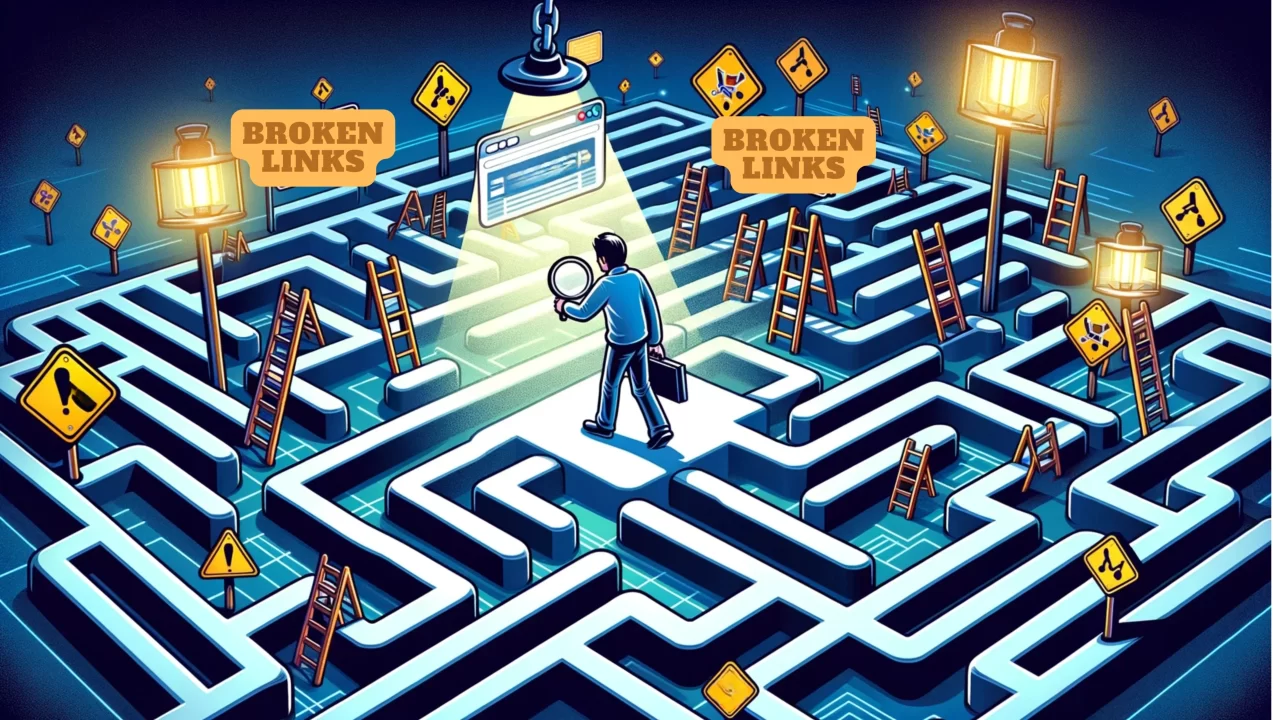In SEO, navigating link building mistakes makes or breaks successful websites. It involves procuring hyperlinks – the conduits of the internet – from other websites to your own. These hyperlinks, commonly known as “backlinks,” serve as endorsements in the eyes of search engines, ultimately affecting page visibility and traffic. Unfortunately, common link building mistakes can derail even the most well-intentioned SEO strategies, causing more harm than good.
Link building techniques have evolved, reflecting the sophistication of search engine algorithms designed to discern and reward genuine value. While numerous approaches promise to enhance your site’s link profile, understanding which strategies to avoid is crucial for SEO success. Missteps, including an overemphasis on quantity over quality, neglecting the relevance of backlinked sites, and ignoring the technical nuances of SEO, can all lead to a weakened link profile. Moreover, overlooking the evolving nature of search engines and their algorithm updates can result in outdated and ineffective strategies.
Key Takeaways
- Effective link building requires a focus on quality, relevance, and technical best practices.
- Strategic insight and content value are pivotal in developing a robust backlink profile.
- Frequent monitoring, adapting to algorithm changes, and forward-thinking strategies are essential for sustainable SEO success.
Understanding the Basics of Link Building
Before you begin enhancing your website’s SEO through link building, it’s crucial to understand what link building is and why it’s important. At its core, link building is acquiring hyperlinks from other websites to your own. These hyperlinks, commonly known as “links,” allow users to navigate between pages on the internet.
Search engines use these links to crawl the web; they’ll crawl the links between the individual pages on your website and the links between entire websites. Not only is link building useful for navigation, but it also plays an instrumental role in SEO. Search engines often view links as “votes” for popularity and importance, making quality link building a significant factor for your website’s ranking and visibility.
When engaging in link building, you should aim for:
- Quality Over Quantity: Having a few high-quality links is better than many low-quality ones.
- Relevance Is Key: Links from sites relevant to your niche are typically more powerful.
- Natural Growth: Engage in strategies that mimic the organic accumulation of links.
- Diversity in Link Sources: Different links from various sources can bolster your website’s strength.
Remember, avoid common link building mistakes like purchasing links or using deceptive tactics, which can lead to penalties from search engines. Aim to build your links in a sustainable and beneficial manner for the long term.
Analyzing Common Link Building Mistakes
To enhance your website’s SEO through link building, you must vigilantly avoid common pitfalls that could undermine your efforts or even harm your website’s reputation.
Ignoring the Quality of Links
Don’t be tempted to prioritize quantity over quality when building links, but this is a major misstep. Understanding that search engines favor high-quality, authoritative links is crucial for SEO success. A link from a reputable, high-traffic website can be worth more than numerous low-quality links. It’s important to ensure that the links pointing to your website are from credible and related sources. Websites like BenchmarkOne highlight the pitfalls of being more selective with link sources.
Overlooking the Importance of Relevance
Another critical oversight is to pay attention to the relevance of your backlinks. Search engines assess the prestige of the linking domains and how relevant the content is to your niche. Align your link-building efforts with websites and content that complement your subject matter. According to Digital Olympus, relevance is a key factor in how search engines evaluate links, so focusing on this aspect can significantly aid your SEO strategy.
Using Only One Type of Link
Relying solely on one kind of backlink, like directory submissions or blog comments, can stifle your SEO growth. Diversify your backlink profile by incorporating various link types, such as editorial links, guest posts, and authoritative directory listings. Aim for a natural blend that reflects genuine endorsement across the web, which can be seen as more trustworthy by search engine algorithms. The guide on Clickass provides valuable insight into developing a broad and effective backlink strategy.
Navigating Common Pitfalls: What to Avoid in Link Building
In the intricate dance of SEO, link building emerges as a pivotal element. However, certain technical missteps can undermine your efforts. Here are specific technical pitfalls you should sidestep to maintain a healthy link profile.
Overusing Exact Match Anchor Text
Diversifying your anchor text is crucial. When you overuse exact match anchor texts—those that exactly match a keyword or phrase you’re targeting—search engines might perceive it as manipulative, which could harm your rankings. Instead, aim for a natural mix of keyword-rich, branded, and miscellaneous phrases.
Neglecting Nofollow Links
Integrating nofollow attributes can signal search engines that certain links shouldn’t affect the target’s ranking. Although some overlook their value, nofollow links contribute to a more balanced link profile, preventing the appearance of manipulative link acquisition.
Failing to Diversify Link Sources
Relying on a narrow set of sites for backlinks can be detrimental. It’s vital to source backlinks from a wide variety of domains. Acquiring links from numerous reputable sites indicates to search engines that your content is valuable and relevant.
Strategic Flaws to Avoid
In link building, overlooking strategic planning can lead to ineffective results. Ensure every step enhances your SEO performance.
1. Not Setting Clear Goals
To succeed in link building, you need to define what success looks like. Your goals could range from improving domain authority to increasing referral traffic. With clear objectives, your efforts may yield the desired results, leading to wasted resources and potential SEO penalties.
2. Overlooking the Competitors’ Link Profiles
Analyzing the link profiles of your competitors is critical. Understanding their strategies can offer valuable insights and help you identify link opportunities they use to their advantage. If you pay attention to this aspect, you may notice key tactics that could elevate your link-building efforts.
Common Content-Related Mistakes
In link building, overlooking the intrinsic value of your content can lead to diminished returns. Remember, high-quality material attracts links naturally and provides long-term SEO benefits.
1. Ignoring Content Quality for Link Acquisition
Your pursuit of backlinks should never compromise content quality. Focusing solely on quantity over quality will likely result in:
- An increase in bounce rates due to poor content signals search engines that your website is not a valuable resource.
- A loss of trust with your audience.
Avoid these repercussions by ensuring every piece of content you create is valuable and informative.
2. Not Promoting Content Effectively
If your content is invisible, it can’t attract links. Effective promotion is critical, and common mistakes include:
- You are not leveraging social media to share and engage with potential link sources.
- You need to reach out to industry influencers who could amplify your content’s reach.
Use diverse promotional strategies tailored to your content and audience to circumvent these issues.
The Role of Social Signals in Link Building
When engaging in link building, you must recognize that social signals—likes, shares, and comments on social media—play a critical role in enhancing your SEO efforts. This is primarily because social signals can indicate content quality and relevance. When your content is shared on social media platforms, it signals that people find your materials engaging and valuable, which can indirectly contribute to your SEO rank.
Here are essential points to understand about social signals:
- Visibility & Trust: Amplified social signals can boost your content’s visibility, increasing the likelihood of obtaining organic backlinks.
- Engagement: High social engagement suggests that your content resonates with users, which can encourage more people to link to it naturally.
While search engines have not explicitly confirmed that social signals are a direct ranking factor, it’s clear that these indicators can lead to behaviors that contribute to your site’s SEO profile.
You should, however, avoid the mistake of thinking that all social shares are equal. A targeted approach, where your content reaches influencers and audiences in your niche, is more likely to yield beneficial backlinks than widespread but irrelevant attention.
Actionable Tips:
- Content Creation: Focus on creating share-worthy content that provides value to your audience.
- Engagement: Actively participate in conversations around your content to foster community and interest.
- Monitoring: Keep track of your content’s performance on social platforms to understand what works best.
Remember, social signals should be part of a comprehensive link building and SEO strategy, emphasizing quality and relevance at every step.
Monitoring and Maintaining Your Backlink Profile
Effective link building strategies require more than just acquiring new backlinks. A key component of SEO success is monitoring and maintaining a clean and reputable backlink profile.
Failing to Remove Harmful Links
You should always be vigilant in checking for harmful links. These backlinks from low-quality or spammy sites can significantly tarnish your website’s SEO performance. If you notice a decline or stagnation in your link profile, it’s often a sign to take action. Use tools to regularly identify and remove these detrimental links to safeguard your site’s credibility.
Not Regularly Auditing Your Link Profile
Regularly auditing your link profile is crucial. More than simply looking at the number of backlinks you have is required. Analyze metrics such as the relevance and authority of linking domains, anchor text distribution, and the growth pattern of your backlink profile. This practice helps you keep track of your SEO efforts and directs you toward more effective strategies. Initiating regular audits can make the difference between a thriving online presence and an ineffective one.
The Balance Between Quantity and Quality of Links
When engaging in link building, you may be tempted to prioritize the number of backlinks over the quality of those links. However, this approach is one of the link building mistakes you should avoid to ensure the effectiveness of your SEO strategy.
- Quality over quantity is essential because search engines, like Google, prioritize relevant links from reputable sources.
- Quantity, while not unimportant, only guarantees higher rankings if the links are from low-quality or irrelevant sites.
Consider these contrasting points:
- A few high-quality links can improve your site’s authority more than numerous low-quality ones.
- A larger number of links might provide short-term visibility but could harm your reputation in the long run if seen as manipulative.
Here is a strategic approach to maintaining balance:
- Assess Relevance: Each link should be relevant to your content to ensure it adds value to your readers.
- Consider Authority: Links from well-respected, authoritative sites carry more weight in search algorithms.
- Check for Value: A link should offer something valuable – educational, entertaining, or enlightening.
By focusing on building high-quality backlinks, you maintain the integrity of your website while fostering an SEO-friendly environment. Remember, in the realm of SEO, a well-placed, high-authority link is worth much more than multiple lower-quality ones.
Adapting to SEO Algorithm Changes
SEO algorithms constantly evolve, and your link building strategies must keep pace. When search engines like Google update their algorithms, they can drastically alter which SEO tactics are effective. These updates aim to improve the quality and relevance of search results for users.
First, stay informed about updates. Follow official search engine blogs and SEO news outlets to receive timely information about algorithm changes that may affect your link building approach.
Second, analyze your analytics. Regularly check your website’s analytics to spot any sudden changes in traffic that could signal an algorithm update. If you notice a drop, it’s time to reassess your link building tactics.
Finally, create high-quality content that naturally attracts backlinks. Quality content is always in favor, regardless of algorithm tweaks. Strive for backlinks from reputable sites, as these are strong indicators of your site’s trustworthiness and authority.
Key Takeaways:
- Keep Up to Date: Monitor SEO news for algorithm changes.
- Watch Your Metrics: Use analytics to detect performance impacts.
- Focus on Quality: Prioritize content quality for sustainable link building.
Adaptability in your link-building strategy is essential for maintaining and improving your SEO rankings amid frequent algorithm changes.
Developing a Future-Proof Link Building Strategy
When designing your link building strategy, aim for resilience against the shifting sands of algorithm updates. Start by understanding that SEO plays a long-term game; quick fixes rarely endure.
Concentrate on Quality Over Quantity
Gathering as many backlinks as possible is tempting, but a future-proof strategy requires high-quality links from reputable sources. Relevant, authoritative backlinks can significantly bolster your SEO ranking. Remember, one quality link can outperform a dozen mediocre ones.
- Research potential link partners meticulously.
- Prioritize industry-leading sites that complement your niche.
Opt for Natural Link Growth
Avoid patterns that suggest artificial link acquisition. Search engines reward natural growth, so devise a pacing strategy that feels organic and sustainable.
- Schedule link acquisition gradually.
- Diversify anchor texts to reflect natural linking behavior.
Stay Updated on SEO Practices
SEO trends evolve, and practices considered acceptable today may fall out of favor. Keep your pulse on SEO news to adapt quickly.
- Regularly consult SEO authorities for updates.
- Implement changes aligned with best practices to maintain relevance.
Invest in Relationships
Successful link building often stems from robust professional networks. Forge genuine connections that can translate into valuable backlinks.
- Initiate collaborations that provide mutual benefits.
- Engage with your network consistently, not just when you need a link.
Remember, a robust link building strategy is not set in stone; it requires ongoing effort, intellect, and flexibility. As you lay the foundation today, you’re setting the stage for SEO success that endures.
Frequently Asked Questions
Link building is a complex aspect of SEO that requires attention to avoid common mistakes. Keep these points in mind to enhance your link building strategies effectively.
What are some common errors that can negatively impact a link building campaign?
A common error that can damage your link building campaign includes focusing on quantity over quality backlinks. Acquiring links from low-authority or spammy websites can lead to search engine penalties.
How can I ensure the quality of links over their quantity in SEO practices?
Audit backlinks for relevance, domain authority, and trustworthiness to ensure the quality of links. Prioritize building relationships with reputable websites related to your industry.
Here are some Advanced Link Building Strategies for Competitive SEO in 2024.
What are the risks of using automated link building tools and software?
Automated link building tools often generate unnatural links quickly, which can be easily detected by search algorithms and could result in penalties or a drop in rankings.
Can you explain how improper anchor text selection can affect SEO?
Improper anchor text selection, such as overly optimized or generic text, can signal manipulation to search engines and negatively impact your site’s relevance and authority.
Why might links from irrelevant websites harm my website’s ranking?
Links from irrelevant websites dilute your link profile and reduce the perceived relevancy of your content, which can lead to lower rankings in search engine results pages.
What key factors should be considered to avoid being penalized for unnatural links?
To avoid penalties, focus on earning links naturally through high-quality content, diversify anchor texts, and regularly audit your backlink profile to disavow harmful links.











